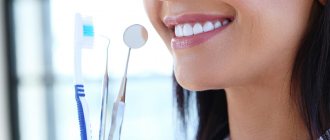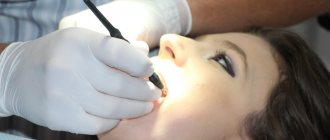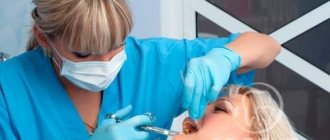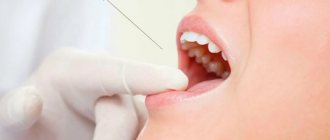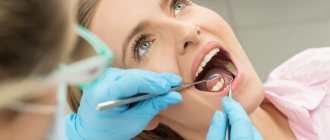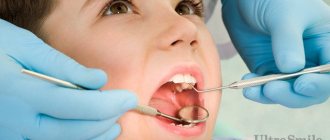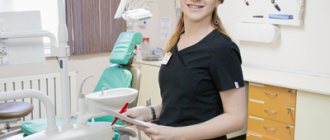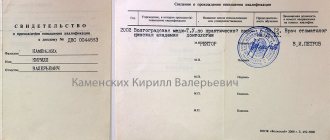Higher education » Medicine. Pharmacy » Dentistry
| Yekaterinburg city | Higher education | |
| Form of study | Distance learning (correspondence course using distance learning technologies) |
Program description:
Specialty: “Dentistry”.
The graduate's qualification is dentist.
The main task of a dentist is the successful detection (diagnosis) and treatment of dental diseases. Dentists are always in demand on the labor market and can easily find a job they like in dental clinics, hospitals, private clinics, or run their own private practice.
A professional dentist must have fundamental knowledge in the field of treatment of diseases of the teeth and oral cavity, be able to make the correct diagnosis, identify the causes and eliminate the consequences of various diseases. Human qualities are also very important in this profession: the desire to help people, the ability to listen to the patient, and find the right approach to him. If you are ready to connect your future with the profession of a dentist, enroll in the specialty “Dentistry” at the USMA and you will become a first-class specialist in your field.
Receive information by e-mail
Reasons for creating a CME system
The main reason is the need to improve the quality of education of doctors, paramedics and pharmaceutical workers. Previously, specialists only needed to regularly take advanced training courses. Having received a certificate every 5 years, health workers could continue to work until the next period of regular training.
However, the medical and pharmaceutical field is developing rapidly. Every year, research is conducted, new drugs and treatment technologies are developed, new diseases and professions appear. To apply up-to-date information in your work, it is not enough to take short training courses every 5 years.
The CME system should solve the problem of lack of qualifications among specialists. A similar method of knowledge control is used in Europe and America. Now healthcare workers will have to collect points annually.
Advantages of CHTA
To master a new profession, persons with secondary specialized medical education can undergo training in preventive dentistry at a licensed organization. It is not always possible to study full-time, attend lectures, or be present at the educational institution during sessions. We offer the best option for busy people: part-time and part-time education using distance learning technologies. It is enough to conclude an agreement and gain access to educational materials. If the final test is passed successfully, a diploma of the established form will be issued.
Listeners can enjoy 24/7 support. Everyone receives a personal curator.
The popularity of part-time and part-time courses using distance learning technologies is explained by their convenience and comfort:
- The training programs are developed in strict accordance with professional standards and the Federal State Educational Standard.
- The ability to independently determine the pace of learning.
- To study, it is enough to have a computer and a stable Internet connection.
- You can be anywhere in the world.
- The preventive dentist diploma is delivered by courier.
- The cost of training is more than affordable.
- You can get a specialty without distraction from your main activity.
A qualified dental hygienist must master all methods of organizing and conducting activities for the necessary oral hygiene and disease prevention. He becomes an indispensable assistant for a dentist, but can also carry out activities independently. Professional quality work is always highly valued.
Features of the CME system
According to the project developed by the Ministry of Health, specialists need to score 250 points - 250 ZET (credit units) - within 5 years of professional activity. 1 point is equal to 1 academic hour of study (45 minutes).
Each year you must complete at least 50 hours of training.
You can choose 1 advanced training course for 36 hours or 2 courses for 18 hours. The remaining 14 hours are achieved through training in non-formal education programs - seminars, webinars, conferences, and so on. This rule applies only to specialists who have been working in their profession for 5 years or more. If a health worker has undergone retraining, he must first pass accreditation and only then gain points for the accreditation exam, which must be passed after the next 5 years. The same applies to graduates of universities and colleges. Immediately after graduation, they must pass a knowledge test at accreditation centers.
Institute of Dentistry named after. E.V. Borovsky
In accordance with Order No. 942R dated November 16, 2017, signed by the rector of the First Moscow State Medical University named after I.M. Sechenov (Sechenov University), Academician of the Russian Academy of Sciences, Professor P.V. Glybochko, from January 1, 2018, the Institute of Dentistry
.
Doctor of Medical Sciences, Professor Irina Mikhailovna Makeeva
.
Faculty of Dentistry
became a structural unit of the Institute of Dentistry of Sechenov University and was transformed into
the Educational Department
of the Institute;
it was headed by Doctor of Medical Sciences, Professor Oleg Ivanovich Admakin
. The Institute of Dentistry carries out educational activities of higher professional education in the specialty 05/31/03 “Dentistry”. Duration of training – 5 years. The form of education is full-time (at the expense of the federal budget and on a paid basis). Fundamentally new in the development of the educational process is the creation of an area for independent work of students with access to telemedicine conferences, web-seminars and the widespread involvement of students in research work.
Currently, about 2,000 Russian and foreign students study at the faculty; they study in 40 departments of the university, of which seven departments are specialized:
1. Department of Maxillofacial Surgery (head of the department - Corresponding Member of the Russian Academy of Sciences, Doctor of Medical Sciences, Professor S.Yu. Ivanov
).
2. Department of Surgical Dentistry (head of the department – Doctor of Medical Sciences, Professor S.V. Tarasenko
).
3. Department of Therapeutic Dentistry (head of the department – Doctor of Medical Sciences, Professor I.M. Makeeva
).
4. Department of Orthopedic Dentistry (head of the department - Doctor of Medical Sciences, Professor A.S. Utyuzh
).
5. Department of Pediatric, Preventive Dentistry and Orthodontics (head of the department - Doctor of Medical Sciences, Professor O.I. Admakin
).
6. Department of Propaedeutics of Dental Diseases (head of the department – Doctor of Medical Sciences, Professor A.V. Sevbitov
).
Continuing medical education is carried out at the Department of Dentistry, formerly part of the Institute of Vocational Education. The department is located on the basis of the Central Scientific Research Institute of Dentistry and Maxillofacial Surgery, the head of the department is Doctor of Medical Sciences, Professor F.F. Losev.
The specialized departments of the faculty work in the postgraduate education system in the following residency programs: “Therapeutic Dentistry”, “Orthopedic Dentistry”, “Children’s Dentistry”, “Orthodontics”, “Surgical Dentistry”, “Maxillofacial Surgery”, as well as postgraduate studies (full-time and correspondence forms). Postgraduate students (full-time and part-time) are trained.
At the Dental Center
Institute of Dentistry (chief physician - Candidate of Medical Sciences
O.P. Emirvelieva
), patients are provided with highly qualified dental care with the participation of the faculty of the departments. The basis of the clinical work of the Institute of Dentistry is a personalized approach to choosing a method of prevention, treatment and rehabilitation, ensuring the safety of dental treatment, starting from the choice of a method of local anesthesia to the mandatory selection of individual means and methods of hygienic oral care. The perfection of diagnostic studies is determined by the presence of a computed tomograph, electromyograph and other innovative diagnostic equipment. In difficult cases, an agreed treatment plan is discussed at an extended consultation with the participation of department professors.
Doctors at the Dental Center provide all types of dental care to children and adults. This is the treatment of caries and non-carious lesions of teeth, correction of occlusal disorders of any degree of complexity, including in a hospital setting, endodontic treatment of teeth using microscopes, dental implantation with the necessary preparation in the form of alveolar bone augmentation, sinus lifting and other osteoplastic operations, surgical treatment of diseases periodontal disease, treatment of diseases of the oral mucosa, salivary glands. The availability of modern lasers makes it possible to carry out highly effective, low-traumatic treatment of inflammatory periodontal diseases and the removal of benign neoplasms of the facial skin and oral mucosa.
Our own dental laboratory allows us to carry out microprosthetics, prosthetics on implants, produce highly aesthetic crowns based on zirconium oxide, and all types of removable dentures.
Taking into account the paradigm of development of educational activities with a research component, supervise research work
The Institute of Dentistry will be Deputy Director for Research, Candidate of Medical Sciences, Associate Professor
A.Yu.
Turkina . It is planned to create our own laboratories and conduct interdisciplinary research together with the laboratories of Sechenov University.
Official CME portal
The Ministry of Health has created a website that records information on the training of medical and pharmaceutical workers:
Currently, almost 1.5 million healthcare workers are registered on the portal. Last year there were fewer participants - 300 thousand. The website keeps records of:
- advanced training programs - over 36 thousand courses;
- interactive educational modules - more than 3800 programs;
- educational organizations that have received permission to train specialists with the accrual of CME points - over 1,100 centers.
Health workers can choose one of the programs presented on the portal for training or contact additional training centers.
To become a participant in the system, a specialist just needs to register on the website using SNILS, enter his full name. and date of birth. After registration, you need to send information about the education you received through your personal account - enter information about the issued diploma and additional documents.
Then the specialist can start gaining points. To do this, it is enough to undergo training in one of the programs on the website or in additional education centers that have permission to award CME points.
Career
The advantages of obtaining a diploma in this specialty for career development: - conducting a critical analysis and assessment of modern scientific achievements; — generation of new ideas for solving specific practical or research problems in the field of dentistry; — development and conduct of comprehensive research in the field of studying the dental health of the population; — participation in the work of Russian and international scientific teams; — participation in the work of international and regional health organizations; — teaching activities in professionally oriented higher educational institutions and colleges. Graduates who have completed the postgraduate program can carry out their activities in clinics, hospitals, and private dental centers. Upon completion of postgraduate studies, graduates have the opportunity to work in modern multidisciplinary centers in the specialty “Dentistry” with in-depth knowledge of diseases of the maxillofacial area and modern methods of their treatment. The result of completing graduate school is also the preparation of highly qualified scientific and scientific-pedagogical clinical personnel for science, education, and practice in the educational program of higher education “Dentistry”. The career stages of a graduate of postgraduate study in the educational program “Dentistry” cover the following qualification categories; 1. In the field of scientific activity: candidate of sciences, doctor of sciences, corresponding member, full member of specialized academies of sciences, member of national and international academies of sciences. During postgraduate studies, it is possible to receive presidential and government scholarships and grants from various national and international funds, and obtain national and international patents. 2. In the field of teaching: assistant, associate professor, professor of the department, member of national and international academies of sciences.
Registration of received points
ZET accounting is carried out automatically. After training, the specialist enters information about the documents received during the courses through his personal account. The procedure for receiving points is as follows:
- choose advanced training courses or informal education;
- undergo training and receive a document;
- enter the document code in your personal account.
If the DPO center can conduct courses with points, after entering the data, the system will verify the information and automatically award ZET.
Procedure for joining the CME system
Only specialists with a medical or pharmaceutical education can become participants, so to join the CME system you must:
- Graduate from a university, college or retraining course in a medical or pharmaceutical specialty.
- Pass the accreditation exam in specialized centers.
- Register on the official CME portal and enter information about educational documents - including a certificate of accreditation.
Immediately after checking the data, the specialist can begin to collect points for periodic accreditation.
